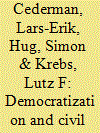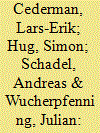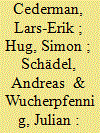|
|
|
Sort Order |
|
|
|
Items / Page
|
|
|
|
|
|
|
| Srl | Item |
| 1 |
ID:
183225


|
|
|
|
|
| Summary/Abstract |
Recent research has found evidence for a linkage between conflict induced-displacement and violence. Yet, displacement is also caused by natural disasters, whose implications for security have until now not received much attention. Drawing on spatial data on flood-induced disasters and forced migration in Africa, we investigate the impact of migration caused by natural disasters on social conflict. We show that disaster-induced displacement differs from conflict-induced displacement and raises distinct security implications. We also consider if areas simultaneously affected by conflict and disaster-induced migration are particularly at risk of conflict. The results suggest that there is no such amplifying effect.
|
|
|
|
|
|
|
|
|
|
|
|
|
|
|
|
| 2 |
ID:
098409


|
|
|
|
|
| Publication |
2010.
|
| Summary/Abstract |
The hypothesis that democratization triggers political violence has been proposed repeatedly in the quantitative literature, but it remains controversial with respect to both interstate and civil wars. Current empirical research continues to be afflicted by methodological and data problems related to the measurement of democracy and the task of detecting changes in such scores. In order to gain further clarity into the link between democratization and civil war, the current study introduces a new period-finding algorithm that is able to detect periods of democratization and autocratization. This allows for a more flexible way of finding directional changes in governance indicators than is possible with the rigid lag structures commonly employed in previous studies. When regressed on various measures of civil-war onset, the indicator for the initiation of a period of democratization has a strong and robust effect on conflict even in the presence of static measures of regime type. The same applies to autocratization, but its impact is much more sudden than that of democratization. Moreover, we find that the democratization effect is limited to governmental rather than territorial conflicts. Further research will be needed to confirm these results in terms of the relevant causal mechanisms, especially in ethno-nationalist civil wars.
|
|
|
|
|
|
|
|
|
|
|
|
|
|
|
|
| 3 |
ID:
073157


|
|
|
|
|
| Publication |
London, Routledge, 2006.
|
| Description |
xx, 306p.
|
| Standard Number |
0415385075
|
|
|
|
|
|
|
|
|
|
|
|
Copies: C:1/I:0,R:0,Q:0
Circulation
| Accession# | Call# | Current Location | Status | Policy | Location |
| 051512 | 343.24/KON 051512 | Main | On Shelf | General | |
|
|
|
|
| 4 |
ID:
140177


|
|
|
|
|
| Summary/Abstract |
This article evaluates the effect of territorial autonomy on the outbreak of internal conflict by analyzing ethnic groups around the world since WWII. Shedding new light on an ongoing debate, we argue that the critics have overstated the case against autonomy policies. Our evidence indicates that decentralization has a significant conflict-preventing effect where there is no prior conflict history. In postconflict settings, however, granting autonomy can still be helpful in combination with central power sharing arrangements. Yet, on its own, postconflict autonomy concessions may be too little, too late. Accounting for endogeneity, we also instrument for autonomy in postcolonial states by exploiting that French, as opposed to British, colonial rule rarely relied on decentralized governance. This identification strategy suggests that naïve analysis tends to underestimate the pacifying influence of decentralization.
|
|
|
|
|
|
|
|
|
|
|
|
|
|
|
|
| 5 |
ID:
140817


|
|
|
|
|
|
|
|